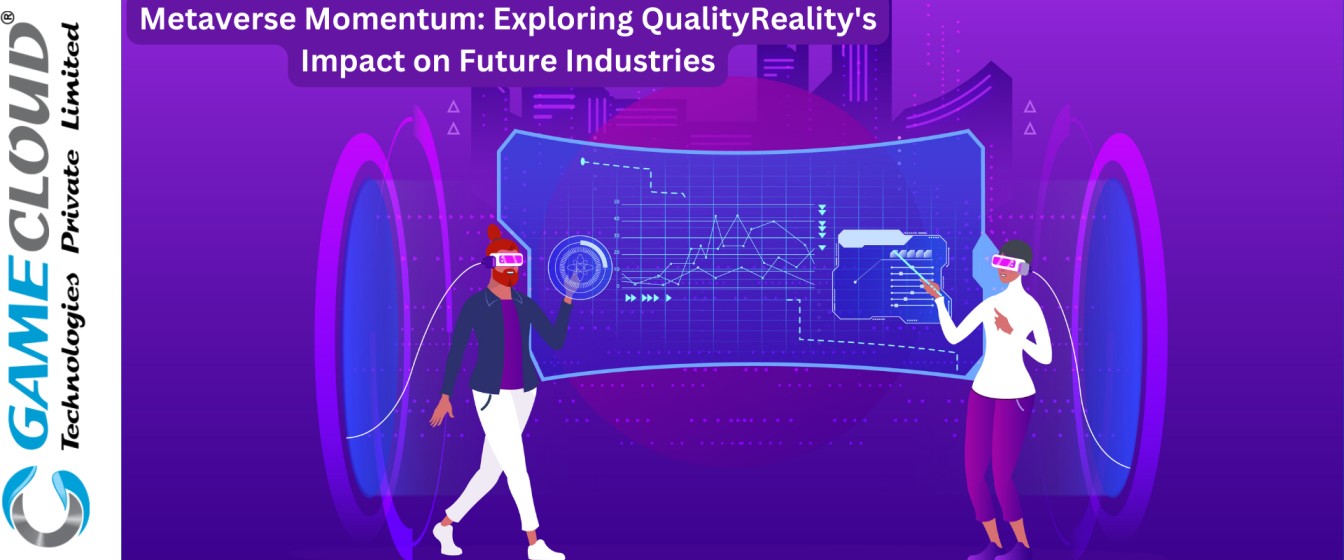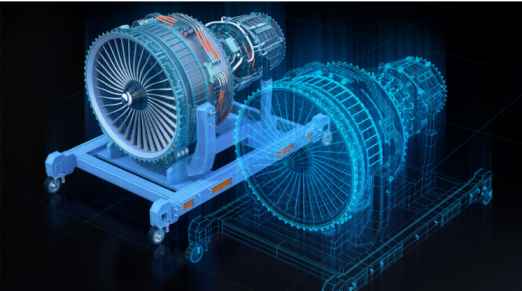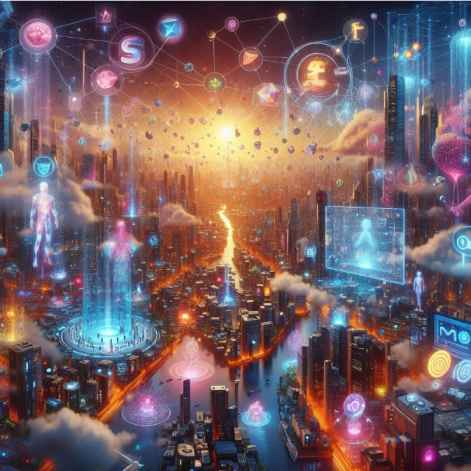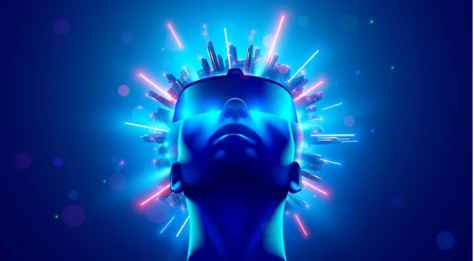
The metaverse, a concept that has been gaining significant attention in recent years, is poised to revolutionise various industries, including manufacturing, healthcare, education, and entertainment. QualityReality, a division of GameCloud Technologies, is at the forefront of this revolution, specialising in Extended Reality (XR) and Metaverse Services. With its team of experts dedicated to pioneering XR solutions, QualityReality is committed to leading the charge in the transformative world of XR and Metaverse.
Industrial Metaverse: A Game-Changer for Manufacturing
The industrial metaverse, in particular, holds immense potential for the manufacturing sector. According to a study by Deloitte and the Manufacturing Leadership Council (MLC), executives anticipate an increase of 12% or more in several key performance indicators, including quality, throughput, and labour productivity, through metaverse initiatives. The study highlights the significant investments already made by manufacturers in metaverse technologies, with nearly three-quarters planning to increase their investments over the next one to three years.
The industrial metaverse offers a wealth of opportunities for the manufacturing industry, including the modelling and simulation of production processes and facilities, virtual prototyping, training, design, and collaboration with teams, suppliers, and customers across the globe. However, the study also identifies challenges, such as cost and ROI considerations, the lack of employees with the right skills and knowledge, and integration between existing technologies and systems.
Digital Twins: A Key Component of the Industrial Metaverse
Digital twins play a pivotal role in the industrial metaverse, offering virtual replicas of physical systems or environments that are essential for simulation, analysis, and understanding complex scenarios in a virtual space. Here’s an expanded view of how digital twins are integral to the industrial metaverse, aligning with the main theme of the metaverse:
- Simulation and Analysis: Digital twins enable industries to simulate and analyse various scenarios in a virtual environment, providing a cost-effective and risk-free way to test different processes, products, or systems. This capability allows for in-depth exploration and understanding of complex industrial operations without the need for physical prototypes.
- Reduced Costs and Risks: By utilising digital twins in the industrial metaverse, companies can significantly reduce costs associated with real-world testing and prototyping. This reduction in expenses translates to more efficient product development cycles, as companies can iterate and optimise designs virtually before committing to physical production.
- Accelerated Innovation: Digital twins facilitate accelerated innovation by streamlining the product development process. Companies can leverage digital twins to quickly test and refine designs, identify potential issues, and optimise performance, leading to faster time-to-market for new products and services.

4. Enhanced Collaboration: The use of digital twins in the industrial metaverse promotes collaboration among teams, regardless of geographical boundaries. Virtual replicas allow for real-time monitoring, predictive maintenance, and collaborative decision-making, empowering teams to work together on complex systems and processes from anywhere in the world.
5. Improved Efficiency and Decision-Making: Digital twins in the industrial metaverse enhance operational efficiency by providing real-time insights and data-driven decision-making capabilities. Companies can leverage digital twins to monitor performance, predict maintenance needs, and optimise processes, leading to improved efficiency and reduced downtime.
Sustainability and the Industrial Metaverse
The industrial metaverse could be a game-changer in our collective pursuit of sustainability. By enabling detailed, predictive analyses of products and systems before they are physically built, we can make informed decisions that not only consider economic viability but also environmental impact. This approach has the potential to significantly re
Industries Expected to be Reshaped by the Metaverse
- Information Technology
The IT industry is at the forefront of the Metaverse revolution, with companies like Meta, Apple, and Microsoft leading the charge. They are leveraging the technology to:
- Improve Workflows: The Metaverse enables teams to collaborate more effectively, with virtual whiteboards and 3D models facilitating communication and idea-sharing.
- Create Personalised Customer Experiences: Companies can create immersive, interactive experiences for customers, enhancing engagement and loyalty.
- Develop Innovative AR Marketing Tools: The Metaverse allows for the creation of augmented reality (AR) marketing campaigns that can be experienced in-store, online, or in-person.
- Music Industry
The Metaverse has opened up new opportunities for the music industry, enabling artists to:
- Create Immersive Experiences: Artists can create virtual concerts, music festivals, and other events that can be experienced by fans worldwide.
- Engage with Fans in New Ways: The Metaverse enables artists to interact with fans in real-time, through virtual meet-and-greets, Q&A sessions, and other interactive experiences.
- Monetise Their Content: Artists can sell virtual merchandise, offer exclusive content, and generate revenue through virtual concerts and events.
- Real Estate Industry
The Metaverse has enabled the real estate industry to:
- Offer Virtual House and Hotel Tours: Potential buyers and renters can explore properties remotely, reducing the need for physical visits and increasing the efficiency of the buying process.
- Enhance Property Listings: Virtual tours can be used to showcase properties in a more engaging and interactive way, increasing the chances of sale or rental.
- Provide Virtual Property Management: The Metaverse can be used to manage properties remotely, with virtual tours and maintenance requests.
- Hospitality Industry
The Metaverse has transformed the hospitality industry, enabling:
- Virtual Tours: Hotels and resorts can offer virtual tours of their properties, allowing guests to explore and book rooms more easily.
- Enhanced Guest Engagement: The Metaverse can be used to create immersive experiences for guests, such as virtual tours of local attractions and events.
- Personalised Customer Service: Hotels and resorts can use the Metaverse to offer personalised customer service, with virtual concierges and other interactive experiences.

- Financial Industry
The Metaverse has created new opportunities for the financial industry, enabling:
- Secure Trading: The Metaverse can be used to create secure, decentralised trading platforms, reducing the risk of fraud and increasing efficiency.
- Access to Crypto Wallets: The Metaverse can be used to access and manage crypto wallets, making it easier for investors to buy, sell, and store cryptocurrencies.
- Decentralised Finance (DeFi) Applications: The Metaverse can be used to create DeFi applications, such as lending platforms and decentralised exchanges.
- Healthcare Industry
The Metaverse has the potential to revolutionise healthcare, enabling:
- Virtual Surgical Procedures: Surgeons can practise and perform surgeries in a virtual environment, reducing the risk of complications and improving outcomes.
- Remote Consultations: Patients can consult with doctors remotely, reducing the need for physical visits and increasing access to healthcare services.
- Immersive Patient Education: The Metaverse can be used to create immersive experiences for patient education, improving understanding and compliance with treatment plans.
- Education Industry
The Metaverse has opened up new opportunities for education, enabling:
- Virtual Classrooms: Students can attend virtual classes, reducing the need for physical classrooms and increasing access to education.
- 3D Models of Lessons: The Metaverse can be used to create 3D models of lessons, making complex concepts more engaging and interactive.
- Immersive Learning Experiences: The Metaverse can be used to create immersive learning experiences, such as virtual field trips and interactive simulations.
- Automotive Industry
The Metaverse is transforming the automotive industry, enabling:
- Virtual Test Drives: Car buyers can take virtual test drives, reducing the need for physical test drives and increasing the efficiency of the buying process.
- Immersive Experiences for Car Buyers: The Metaverse can be used to create immersive experiences for car buyers, such as virtual tours of cars and dealerships.
- Autonomous Vehicles: The Metaverse can be used to develop and test autonomous vehicles, improving safety and efficiency.
- Manufacturing Industry
The Metaverse is helping to shape an exciting time for the manufacturing industry, enabling:
- Immersive Experiences: The Metaverse can be used to create immersive experiences for manufacturing, such as virtual tours of factories and production lines.
- Simulations and Visualisations: The Metaverse can be used to create simulations and visualisations of manufacturing processes, improving decision-making and production efficiency.
- Virtual Training: The Metaverse can be used to create virtual training programs for manufacturing workers, improving safety and productivity.
- Entertainment Industry
The Metaverse is set to revolutionise the entertainment industry, enabling:
- Immersive Experiences: The Metaverse can be used to create immersive experiences for entertainment, such as virtual concerts and events.
- Virtual Events: The Metaverse can be used to host virtual events, such as conferences and festivals, reducing the need for physical venues and increasing accessibility.
- New Forms of Storytelling and Engagement: The Metaverse can be used to create new forms of storytelling and engagement, such as interactive narratives and immersive games.
QualityReality’s Metaverse Services
QualityReality’s Metaverse services focus on creating a collective virtual shared space where users can interact with each other and the environment around them. The company’s approach to the Metaverse is centred around the concept of a fully immersive virtual world powered by Web 3.0 technologies. QualityReality’s Metaverse services include marketplaces, NFT trading, and blockchain technology, which enable the creation of a single virtual economy that can be used across different applications.
QualityReality’s Approach to Quality and Consistency
QualityReality’s approach to quality and consistency is centred around a rigorous testing process that ensures products meet high standards for quality, performance, and user experience. The company’s hardware testing capabilities cover a wide range of areas, from evaluating the performance and durability of hardware components to testing user interactions and user experience. By testing across a range of hardware configurations, QualityReality helps identify any potential issues and ensures that XR products are optimised for maximum performance and user experience.

The Future of the Metaverse
The Metaverse is poised to revolutionise the future of business, with an overwhelming 95% of business leaders anticipating a positive impact on their industries within the next five to ten years. This virtual realm holds the potential to surpass the internet, offering boundless opportunities for growth and innovation. Projections indicate a substantial growth trajectory for the global Metaverse market, with an expected Compound Annual Growth Rate (CAGR) of 39.4% between 2022 and 2030, potentially reaching a market value of $678.80 billion by 2030. This transformative technology is not just a futuristic concept but a tangible reality as companies heavily invest in creating a fully-realised digital universe. The Metaverse’s influence is already being felt across various sectors, from gaming to education, promising to reshape how individuals interact with digital content. As the Metaverse continues to evolve, it is set to redefine business landscapes, offering unparalleled opportunities for innovation and advancement, ultimately shaping the future of industries worldwide.
Conclusion
The metaverse, and the industrial metaverse in particular, is poised to transform various industries, including manufacturing. QualityReality, with its expertise in XR and Metaverse Services, is well-positioned to lead this transformation. As the industrial metaverse unfolds, it is essential to navigate challenges and seize opportunities, including the need for robust cybersecurity measures and the reskilling of the workforce. The industrial metaverse represents a virtual ecosystem that mirrors the real-world manufacturing environment, combining physical spaces with digital counterparts. This convergence enables manufacturers to optimise operations, enhance productivity, and create seamless end-to-end value chains.
